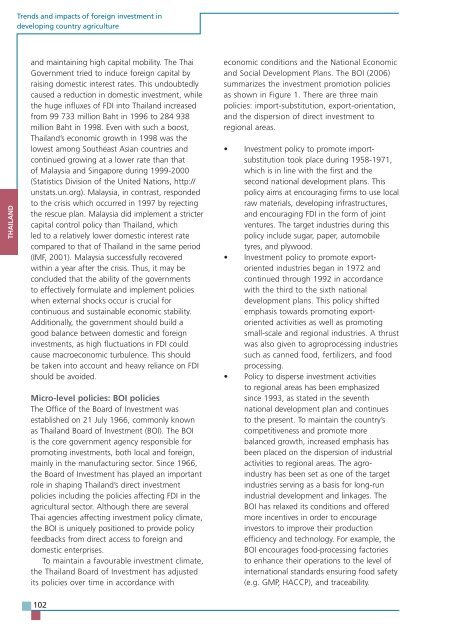TRENDS AND IMPACTS OF FOREIGN INVESTMENT IN DEVELOPING COUNTRY AGRICULTURE
TRENDS AND IMPACTS OF FOREIGN INVESTMENT IN DEVELOPING COUNTRY AGRICULTURE
TRENDS AND IMPACTS OF FOREIGN INVESTMENT IN DEVELOPING COUNTRY AGRICULTURE
Create successful ePaper yourself
Turn your PDF publications into a flip-book with our unique Google optimized e-Paper software.
THAIL<strong>AND</strong><br />
Trends and impacts of foreign investment in<br />
developing country agriculture<br />
and maintaining high capital mobility. The Thai<br />
Government tried to induce foreign capital by<br />
raising domestic interest rates. This undoubtedly<br />
caused a reduction in domestic investment, while<br />
the huge influxes of FDI into Thailand increased<br />
from 99 733 million Baht in 1996 to 284 938<br />
million Baht in 1998. Even with such a boost,<br />
Thailand’s economic growth in 1998 was the<br />
lowest among Southeast Asian countries and<br />
continued growing at a lower rate than that<br />
of Malaysia and Singapore during 1999-2000<br />
(Statistics Division of the United Nations, http://<br />
unstats.un.org). Malaysia, in contrast, responded<br />
to the crisis which occurred in 1997 by rejecting<br />
the rescue plan. Malaysia did implement a stricter<br />
capital control policy than Thailand, which<br />
led to a relatively lower domestic interest rate<br />
compared to that of Thailand in the same period<br />
(IMF, 2001). Malaysia successfully recovered<br />
within a year after the crisis. Thus, it may be<br />
concluded that the ability of the governments<br />
to effectively formulate and implement policies<br />
when external shocks occur is crucial for<br />
continuous and sustainable economic stability.<br />
Additionally, the government should build a<br />
good balance between domestic and foreign<br />
investments, as high fluctuations in FDI could<br />
cause macroeconomic turbulence. This should<br />
be taken into account and heavy reliance on FDI<br />
should be avoided.<br />
Micro-level policies: BOI policies<br />
The Office of the Board of Investment was<br />
established on 21 July 1966, commonly known<br />
as Thailand Board of Investment (BOI). The BOI<br />
is the core government agency responsible for<br />
promoting investments, both local and foreign,<br />
mainly in the manufacturing sector. Since 1966,<br />
the Board of Investment has played an important<br />
role in shaping Thailand’s direct investment<br />
policies including the policies affecting FDI in the<br />
agricultural sector. Although there are several<br />
Thai agencies affecting investment policy climate,<br />
the BOI is uniquely positioned to provide policy<br />
feedbacks from direct access to foreign and<br />
domestic enterprises.<br />
To maintain a favourable investment climate,<br />
the Thailand Board of Investment has adjusted<br />
its policies over time in accordance with<br />
102<br />
economic conditions and the National Economic<br />
and Social Development Plans. The BOI (2006)<br />
summarizes the investment promotion policies<br />
as shown in Figure 1. There are three main<br />
policies: import-substitution, export-orientation,<br />
and the dispersion of direct investment to<br />
regional areas.<br />
Investment policy to promote importsubstitution<br />
took place during 1958-1971,<br />
which is in line with the first and the<br />
second national development plans. This<br />
policy aims at encouraging firms to use local<br />
raw materials, developing infrastructures,<br />
and encouraging FDI in the form of joint<br />
ventures. The target industries during this<br />
policy include sugar, paper, automobile<br />
tyres, and plywood.<br />
Investment policy to promote exportoriented<br />
industries began in 1972 and<br />
continued through 1992 in accordance<br />
with the third to the sixth national<br />
development plans. This policy shifted<br />
emphasis towards promoting exportoriented<br />
activities as well as promoting<br />
small-scale and regional industries. A thrust<br />
was also given to agroprocessing industries<br />
such as canned food, fertilizers, and food<br />
processing.<br />
Policy to disperse investment activities<br />
to regional areas has been emphasized<br />
since 1993, as stated in the seventh<br />
national development plan and continues<br />
to the present. To maintain the country’s<br />
competitiveness and promote more<br />
balanced growth, increased emphasis has<br />
been placed on the dispersion of industrial<br />
activities to regional areas. The agroindustry<br />
has been set as one of the target<br />
industries serving as a basis for long-run<br />
industrial development and linkages. The<br />
BOI has relaxed its conditions and offered<br />
more incentives in order to encourage<br />
investors to improve their production<br />
efficiency and technology. For example, the<br />
BOI encourages food-processing factories<br />
to enhance their operations to the level of<br />
international standards ensuring food safety<br />
(e.g. GMP, HACCP), and traceability.


